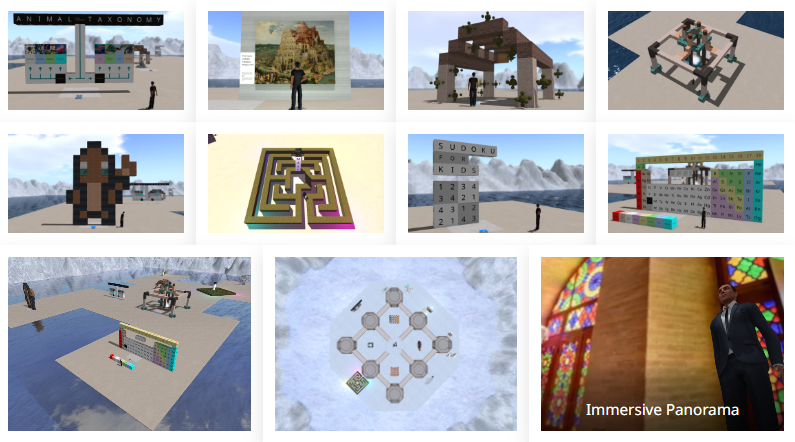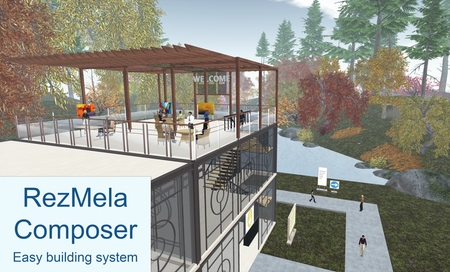- Editor’s Note: RezMela is an add-on to OpenSim that allows for easier creation of in-world content — everything from physical environments to animated NPCs. Today, at 4:30 p.m. Pacific time at the OpenSim Community Conference, its creator, Ramesh Ramloll, will talk about how the platform will now be free and open source, integrated with DreamGrid, and even support GPT-powered bots. You can watch an introduction to RezMela in the video below, visit the demo region on Kitely, and check out this playlist of RezMela tutorials for more information.
Empowering users in the metaverse: an open source approach
Empowering users should always be the primary focus of the metaverse and virtual worlds. Our open-source project aims to develop a user-generated content platform that allows users to easily create, modify, and share high-quality content to support applications that have real-world impact. We believe that empowerment is the next level challenge in achieving maximum engagement in any application or environment.
Currently, entertainment applications dominate virtual world experiences, mostly because of the well-understood Skinnerian box design strategy which industry loves because it provides a simplified means to measure traction. In an attention economy where ethics have often taken a back seat, users are incentivized to return to an experience, even if they are not particularly interested in it after its novelty has faded. This is often achieved by reward systems that are unrelated to the virtual experience itself. Whether the experience increases well-being or is addictive is not particularly of concern in a profit-making enterprise. There is certainly a need for more applications that enhance cognition and productivity to create a balanced ecosystem of use cases for the metaverse.
We propose a multi-disciplinary open-source strategy to advance the metaverse from a collaborative design perspective. Our strategy focuses on empowering users by providing them with the tools, resources, and support they need to take control of their own experiences and to make meaningful and positive contributions to the virtual and real world. We believe that this approach will resonate with end users who are looking for applications that facilitate their work or daily lives, as well as with educators who are seeking new pedagogical approaches to explore and advance.

Open source resilience
As an open-source effort, we face an uphill battle against well-funded corporations that can invest billions of dollars in achieving goals that at the surface are hard to distinguish from ours. However, one of our key advantages is that the opensim platform is designed to be decentralized from the very beginning. This decentralized design provides numerous benefits and is a major strength of our platform. In short, decentralized systems are better than centralized ones because they allow for the distribution of power, eliminating the need for a single, centralized authority.
We believe that open-source projects like ours can be more resilient in the long run because they are not dependent on a single company or organization. When a company that supports a proprietary system goes out of business or changes its focus, the users of that system are often left stranded with no support or options. In contrast, open-source projects are supported by a community of users and developers who are invested in their success and are committed to maintaining and improving the system over time.
RezMela: a much needed user-facing layer for OpenSim
Our goal is to carefully plan and execute this process to ensure that our RezMela platform code is properly documented and supported. To facilitate collaboration, we plan to set up a Discord server and a forum for asynchronous communication. Our existing website provides information about our initial set of applications. Some of these applications are currently available on the Kitely Market but since we want our offerings to run on any grid we will be making it freely available during the first quarter of next year.

We are working with the makers of Outworldz DreamGrid to integrate the RezMela platform into their offering. This will allow end users not only to be able to set up their own regions with the ease that DreamGrid makes possible but soon users will be able to create advanced virtual experiences as well.
We believe that the philosophy of design is important in setting the context for our work. That is why we have written a book to explain our philosophy and road map for the future. This book is based on our collective experience in implementing multi-disciplinary design for software applications that have real-world impact.
Our current platform allows users to organize content into modules that interact with applications that can be deployed on any piece of virtual land. These apps can have a range of functions that the end user can easily customize. The content of these modules can be as simple as a rock or as advanced as a tree that changes its appearance at the click of a button to match the season, or even an advanced AI NPC powered by the IBM Watson conversation engine.
We also have apps that are integrated with Google Street View, allowing users to create virtual tours of any location on Earth. The apps allow users to create scenes consisting of objects sourced from these modules, which can be saved and shared with others. The point-and-click functionality of our apps allows for rapid and efficient creation of virtual museums and campuses.
More recently, we developed a user-facing scripting language to control the behavior of OpenSim NPCs, or bots. Our current system supports a wide range of applications, which are described on our website. As we open-source these applications, we plan to focus on documenting and growing our user base to help build a knowledge base and make support easier for all.
In terms of future functionality, we plan to integrate APIs for more powerful AI engines, such as the GPT series from OpenAI, into our modules.
We have also written a book to share the body of knowledge on which our work is based, in order to inspire and guide new members of our community in advancing the envelope effectively.
Current team and forthcoming book
Our current team is small, consisting of only five members: Ramesh Ramloll, Andrew Hellershencks, Anabel Nowak, Ludovic Lotoah, and Sue Claxton. We will also be collaborating with Fred Beckhusen, well known developer of Outworldz DreamGrid.
However, our team is designed to be multi-disciplinary in nature, as we believe this is necessary for our open source design efforts.
We will be publishing a book in the first quarter of next year that explains the need for a multi-disciplinary approach and welcomes participation from individuals with a wide range of expertise, including coders, artists, 3D modelers, cognitive scientists, neuroergonomics experts, storytellers, and video production makers. We believe that everyone can contribute something valuable to our project.
We are well aware that this project is ambitious. Building a new layer of technology on top of the only decentralized, open-source Metaverse platform, Open Simulator, is not a small undertaking. While this article provides an overview of why this layer could be important, our forthcoming book, which will become available during the first quarter next year, will do a better job of explaining the various streams of thought that led to this effort.
Financial concerns
As with any project, financial sustainability is a concern. In the past, I made the mistake of not paying attention to the amount of money I was investing and became too focused on the urgency of the mission. I never paid myself for the years the project ran, and while I tried my best to remunerate contributors, I always felt I could do more.
Funding will always be a priority, and I will try to use my experience to raise funding through grants. However, we also hope that the traction our products gain will open up donation opportunities. We plan to open an online Merchandise store where we could sell items that could help to spread the word about our efforts. We are open to suggestions and support in figuring out the best ways to sustain this project.
As with any open-source effort, we recognize that this is a community project and will continue to hold meetings where anyone can join to learn about the status of our effort, meet other users, and get help as needed.
Invitation to participate
As you can see, we have a lot to contribute to the OpenSimulator community. We are working hard to make this possible and welcome your interest in our progress. If you would like to stay updated on our activities, please visit our sign-up page and share your contact information with us. We look forward to keeping you informed and involving you in our efforts.
- RezMela is a CMS for OpenSim, and it’s going free and open source - December 10, 2022
